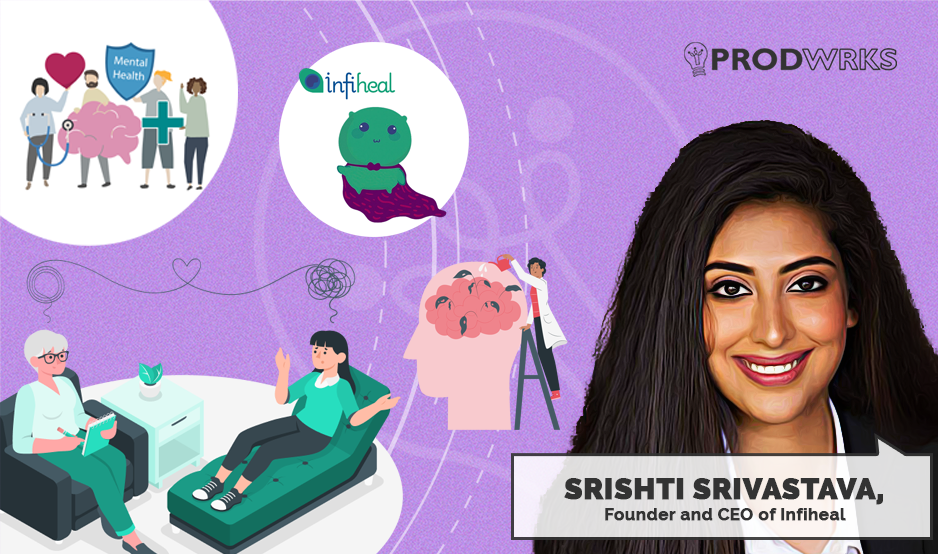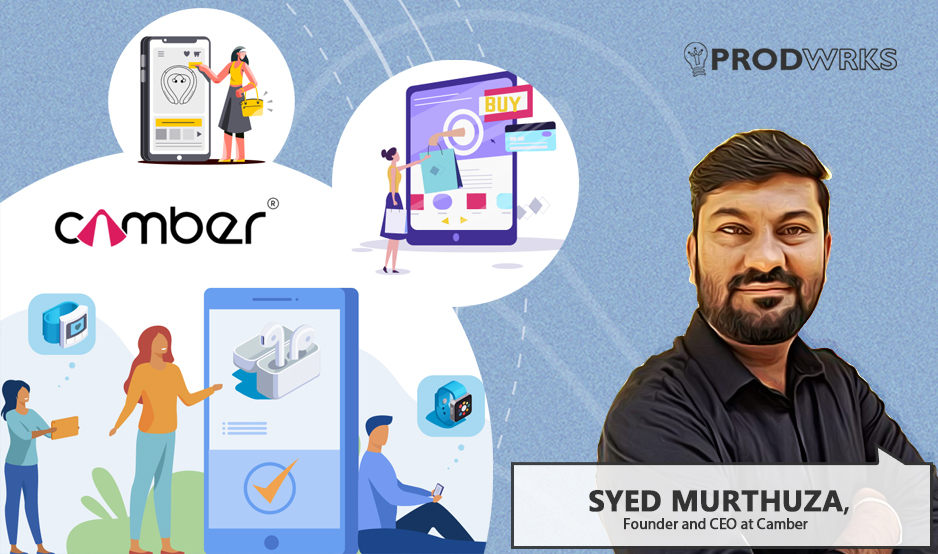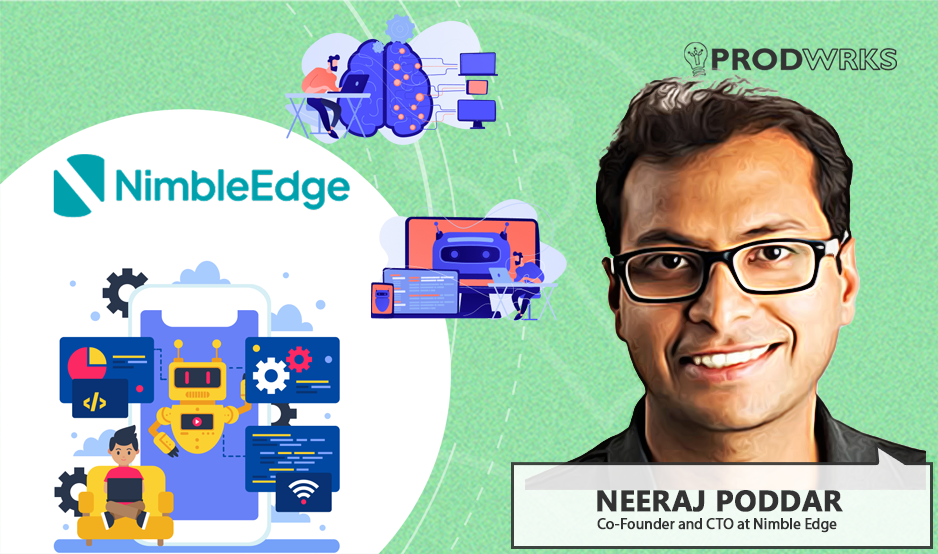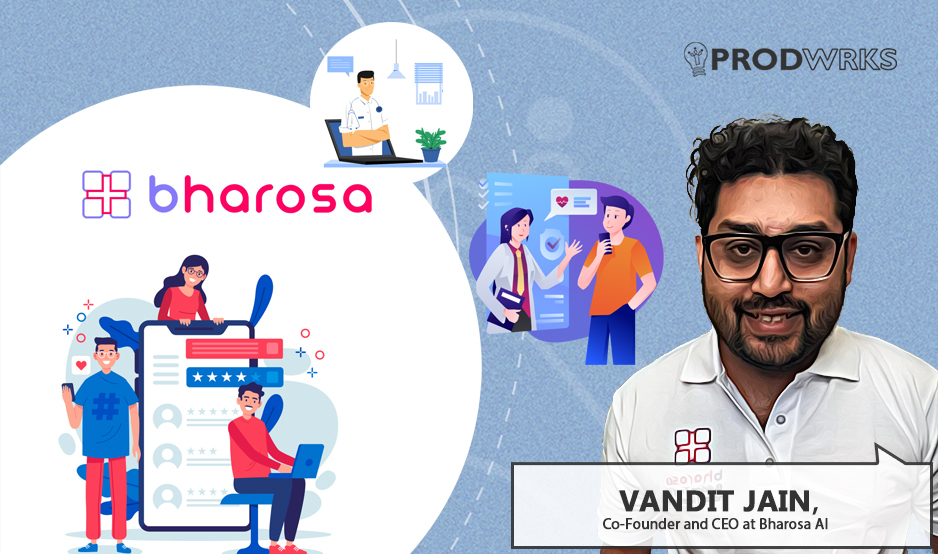
India has only 0.7 mental health professionals per 1,00,000 people–far below the WHO’s recommendation of three per 1,00,000–creating a crisis where millions struggle to access support. This shortage is worsened by deep-rooted societal stigma and high therapy costs ranging from ₹1000 to ₹5,000 per session (sometimes more), making mental healthcare inaccessible to many.
For those who seek help despite these barriers, navigating the system can be daunting. Srishti Srivastava, Founder and CEO of mental health startup Infiheal, has experienced this firsthand.
At 12, Srishti competed on Child Genius, a national TV quiz show, where she froze on stage—a moment that sparked a profound realization. “I didn’t know I was neurodivergent until then,” she says. This discovery led her to explore therapy, exposing her to India’s fragmented mental health landscape.
“When my family moved from Nagpur to Mumbai, I saw the stark difference,” she recalls. “There were fewer therapists in relatively smaller cities like Nagpur, while Mumbai had plenty. The distribution was completely uneven.”
Even in a well-served city like Mumbai, most therapists are booked out for at least a week, and finding the right match is difficult. “It typically takes around three sessions to find the right fit. For an average ₹1,000/hour therapy session, that’s about ₹3,000 just to identify the right therapist,” she explains.
This glaring gap between supply and demand led Srishti to launch Infiheal, an AI-driven mental wellness startup. Its flagship product, Healo, acts as an AI co-therapist (chatbot), offering users psychological insights, self-care resources, and access to mental health experts.
Risk-Based User Segmentation: From Everyday Stress to Critical Crises
Infiheal serves both individuals seeking mental health support (B2C) and organizations integrating well-being initiatives (B2B) through tech-driven solutions. At the heart of this ecosystem is Healo, Infiheal’s AI-powered therapist, which monitors user interactions in real-time and suggests relevant resources based on individual needs.
To enhance AI-driven outcomes, Infiheal has developed a comprehensive ecosystem combining therapy tools, psychometric tests, self-help resources (text and video content), qualified therapists, and support communities.
Srishti categorizes the platform’s end users into three segments based on “risk levels”:
1. Low-Risk Users: Individuals seeking guidance for everyday struggles such as building confidence, managing stress, boosting self-esteem, or navigating relationships. Healo autonomously provides insights, structured advice, and behavioral recommendations.
2. Medium-Risk Users: Users in this category navigate active psychological struggles like heartbreak, toxic workplace environments, anxiety, depression, or personal trauma. Healo provides structured psychoeducation, explaining symptoms, causes, and coping strategies based on the biopsychosocial model.
While AI offers educational insights, human intervention sometimes becomes critical at this stage. Infiheal connects users with therapists and support resources.
3. High-Risk Users: The most severe cases involve self-harm, addiction, psychotic episodes, or suicidal thoughts. As AI alone cannot handle these cases, it recognizes warning signs and triggers safety protocols.
Healo operates 24/7 and has protocols to assess when users need self-help resources, helpline support, therapist matching, or emergency intervention. These decision triggers are designed with mental health professionals.
“You don’t get to choose who comes in. Someone seeking dating advice today could be in crisis tomorrow. AI must be prepared for both and make the right call,” Srishti explains. “For high-risk cases, AI isn’t the solution but a bridge to real, immediate help.”
A Startup That Pivoted With Market Insights
Infiheal didn’t start as an AI company. Initially, Srishti envisioned a meditation and mindfulness platform similar to Calm and Headspace for Indian users. However, unlike the West, meditation in India is deeply tied to religion, with many preferring spiritual gurus over apps, making adoption difficult.
This realization, combined with the growing awareness of mental health during the COVID-19 pandemic, led to a critical pivot–onboarding psychologists and developing digital tools to facilitate therapy.
“During the pandemic, many people took psychometric tests like the Myers-Briggs Type Indicator (MBTI) just for fun. It felt like a good way to introduce people to mental health without being overly clinical,” she says.
Infiheal built personality models and provided screening tests through a rule-based chatbot (their early prototype), allowing users to self-assess mental health conditions and match with the right resources or therapists.
But everything changed in November 2022 with the launch of ChatGPT.
Building Healo: Tackling AI’s Challenges in Mental Health
“When ChatGPT arrived, it showed us the potential of a truly personalized AI therapist. The shift was rapid. By February 2023, just a few months after its release, we had a clear vision of what we wanted to build,” she says.
However, making AI safe for mental health applications posed three major hurdles:
1. Hallucinations: AI-generated false information, a critical risk in mental health.
2. Over-validation and digital Dependency: AI models can be overly reassuring, potentially making users reliant on them instead of seeking real therapy.
3. Western LLMs lack Indian cultural context: Western LLMs lack the cultural nuance necessary for Indian users.
“Srishti explains, “Hallucination rates for psychological use cases were significantly higher than in general AI applications. While OpenAI claims hallucination rates are under 2%, our own tests showed that for psychology-specific tasks, the rates were much higher–closer to 8–10%–a level of error that is very risky in mental health scenarios."
Another issue was the Western bias in AI responses. If an Indian user shared difficulties with their parents, ChatGPT might suggest, ‘Set clear boundaries’ or ‘Consider going no-contact.’
“Western psychological frameworks, like Cognitive Behavioral Therapy (CBT), are built on logic-driven assumptions—challenging irrational beliefs. However, in collectivist cultures like India, such advice isn’t always practical or culturally appropriate. Family dynamics here work differently,” she adds.
The Solution: Building Native Datasets & Culturally Tuned AI Models
To address these challenges, Infiheal built its own dataset from scratch on top of native LLMs, by leveraging:
- Conversationalizing mental health case studies
- Using real-world therapy references
- Chat-based support sessions from their earlier COVID-era experiences
Additionally, the AI was designed to offer culturally nuanced responses aligned with Eastern perspectives while maintaining scientific credibility. “Our approach blends personalized AI, culturally relevant advice, and rigorous data training,” says Srishti.
Today, Infiheal operates on a multi-agent system, using different LLMs for specific tasks based on their strengths. Benchmarking across open-source and closed-source models showed that no single model excelled at everything.
"Instead of relying on just one, we mix and match—some are great at analyzing root causes, while others are better at structured responses. This way, we get the best possible results for different scenarios."
Localization was also a key focus. The platform now supports 93 languages, achieved through third-party speech detection tools and trained with context-aware culturally diverse datasets collected from user interaction with therapists across India.
Key Insights from User Behavior
The Infiheal team actively tracks user behavior and collects feedback to continuously refine the conversational experience. Key insights include:
- Anonymity First: Many users fear judgment. The platform allows anonymous logins, making it easier for people to open up.
- Low Adoption of Voice Messages: Despite introducing voice features, usage remains under 5% as users are concerned about privacy (voice could reveal one’s identity through tone, accent, or background noise). Text-based AI chatbot remains the preferred choice for users.
- Trust & Security: AI in healthcare raises concerns about data privacy. Infiheal integrates subject-matter experts, enforces strict data security, and is working toward certifications for added credibility.
- Human-Like Conversations: Early AI responses felt robotic. Models were trained to generate shorter, sequential responses that mimic real human conversations.
- Time-out feature: Users rarely ended conversations explicitly with a “bye”, making it difficult to trigger conversation summaries. A timeout-based system was implemented to detect inactivity and provide a summary once a resolution was reached.
User Growth Through SEO & Frictionless Access
"People were already searching for solutions like this. Instead of pushing ads and spending extra on marketing, we focused on making sure they could find us."
"For mental health tools, requiring sign-ups upfront is a huge barrier. Letting users try before logging in improves adoption."
Engaged users are presented with different paid plans:
- Light Plan (₹59): Two full AI therapy sessions.
- Gold Plan (₹139): Additional sessions and access to expanded resources.
- Plus Plan (₹249): Five sessions, psychometric tests, and premium tools.
Srishti notes that the low-cost subscription plans allow users to experience the AI platform and make their first digital transaction toward mental wellness.
"In India, digital payments for intangible products aren’t second nature. Even a small fee can be a barrier, so the goal was to ease users into making that first transaction."
Shifting Focus to B2B for Revenue Stability
While B2C fueled growth, Infiheal shifted to B2B partnerships, offering API integrations (annual paid licenses) and enterprise wellness programs to corporates, schools & colleges, hospitals, and coaching centers.
These organizations saw value in offering mental health support to their staff or students in the case of educational institutions. Plus, Infiheal helps them meet compliance requirements mandated by various governing bodies.
The B2B shift ensured sustainable revenue and expanded Infiheal’s impact at scale.
“B2B became our primary revenue stream, but B2C remains essential for training data and refining the user experience,” says Srishti.
Additionally, offering free trials in B2C incurred costs, especially with API calls. However, these costs were balanced against the need for user acquisition and dataset improvement.
While B2B is a money-maker, customer acquisition is a long-haul game.
“We rely heavily on event-based marketing and direct engagement with decision-makers. Sales cycles typically last four to six months, requiring multiple interactions before deals progress. Conferences, seminars, and industry events play a key role in lead generation.”
Habit-Based Engagement Mechanisms in Infiheal
Infiheal currently has around 34,000 monthly active users across B2B and B2C. “We engage and retain users through habit-based recurring activities like journaling, self-care exercises, and guided meditations,” explains Srishti.
User-consented reminders drive engagement, and Infiheal’s success is measured by the total number of messages exchanged per day—Srishti’s North Star metric.
"What really matters is how many messages are being exchanged. If people are having longer conversations, it means they're engaged, and engagement is what ultimately drives value. Monetization can always follow when you have strong user interaction."
The Future of AI in Mental Health
“If your heart rate spikes past 130, your fitness tracker knows—but what if your mental health app did too? Instead of waiting for you to reach out, it could check in first.”
“Not every part of mental health support needs a human touch. AI can take over routine tasks, freeing up time for deeper conversations where they matter.”



